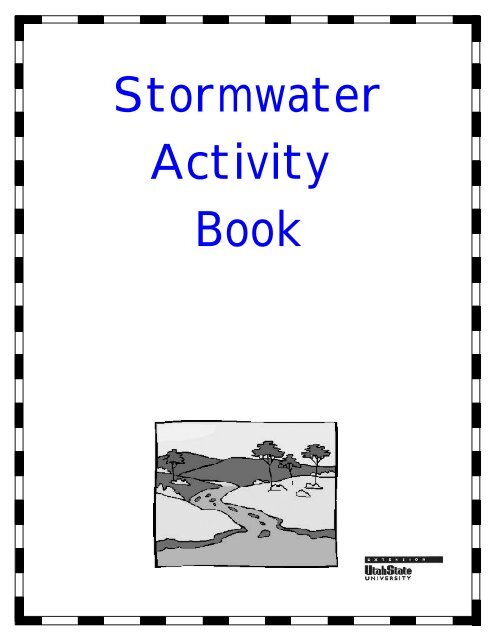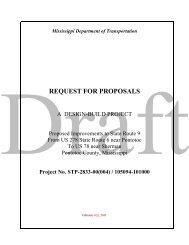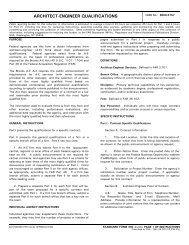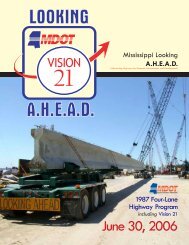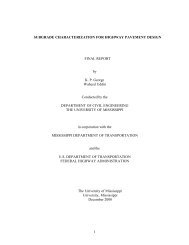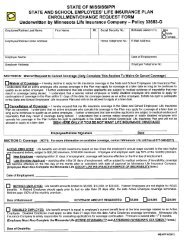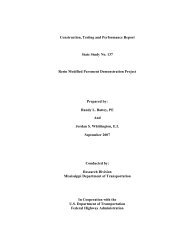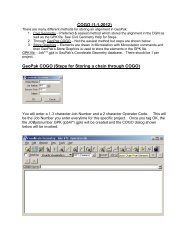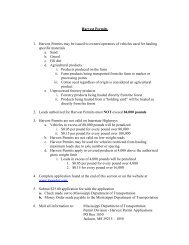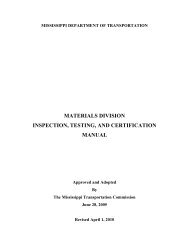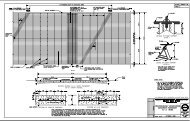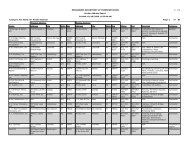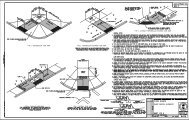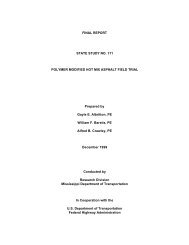Stormwater Activity Book
Stormwater Activity Book
Stormwater Activity Book
Create successful ePaper yourself
Turn your PDF publications into a flip-book with our unique Google optimized e-Paper software.
<strong>Stormwater</strong><br />
<strong>Activity</strong><br />
<strong>Book</strong>
<strong>Stormwater</strong> <strong>Activity</strong> <strong>Book</strong><br />
An activity guide for<br />
stormwater pollution education.<br />
By<br />
Krista Kuester and Nancy Mesner<br />
Illustrated by<br />
Benjamin Kuhns<br />
Aquatic, Watershed, and Earth Resources Department<br />
Utah State University<br />
March 2003<br />
Utah State University is committed to providing an environment free from harassment and other forms of illegal discrimination based on race, color, religion, sex,<br />
national origin, age (40 and older), disability, and veteran’s status. USU’s policy also prohibits discrimination on the basis of sexual orientation in employment<br />
and academic related practices and decisions. Utah State University employees and students cannot, because of race, color, religion, sex, national origin, age,<br />
disability, or veteran’s status, refuse to hire; discharge; promote; demote; terminate; discriminate in compensation; or discriminate regarding terms, privileges, or<br />
conditions of employment, against any person other wise qualified. Employees and students also cannot discriminate in the classroom, residence halls, or in on/off<br />
campus, USU-sponsored events and activities.<br />
This publication is issued in furtherance of Cooperative Extension work. Acts of May 8 and June 30, 1914, in cooperation with the U.S. Department of Agriculture,<br />
Jack M. Payne, Vice President and Director, Cooperative Extension Service, Utah State University.
What is <strong>Stormwater</strong>?<br />
When rain falls or when the snow melts in Utah, where do<br />
you think the water goes? Does it soak into the ground?<br />
Does it sit in puddles until it disappears? If you answered<br />
yes, you are partially right. Some of the water flows over<br />
the land surface, heading downhill to the nearest stream<br />
or ditch. We call this stormwater runoff.<br />
In cities and towns, the water can’t soak through the<br />
pavement, rooftops, and concrete. This means that there’s<br />
more stormwater runoff in cities than in forests and<br />
fields. The water collects in gutters and usually flows<br />
straight into a storm drain. You would recognize a storm<br />
drain as the big grate in the road where the water<br />
disappears. Actually, it connects to a pipe, which carries<br />
the water directly to your local stream or lake.
STORMWATER<br />
Cities and towns have more stormwater runoff than areas in the country<br />
because they have more concrete so the water can’t soak into the ground.<br />
Lead the water droplet through<br />
the maze and into the storm drain.
POLLUTION<br />
Often we think that water pollution only comes from big oil spills or<br />
huge factories. We forget that there are lots of little sources of<br />
pollution all around us. <strong>Stormwater</strong> from cities can become very<br />
polluted. Oil drips on driveways, fertilizers on lawns, loose dirt in<br />
areas with no plants, or dog poop can all be carried by stormwater<br />
to a drain and on to a lake or stream.<br />
Find these stormwater and pollution words in the<br />
word search:<br />
Concrete<br />
Drain<br />
Driveway<br />
Fertilizers<br />
Lawn<br />
Oil<br />
Pesticides<br />
Plants<br />
Rain<br />
Rooftops<br />
Sediment<br />
<strong>Stormwater</strong><br />
Stream
STORMWATER POLLUTION<br />
SEARCH<br />
Compare the picture on this page with the picture on the next page.<br />
Circle all the differences between them. You should circle 6 things.
What do these differences have to do with protecting our water from<br />
stormwater runoff? Look at the next 6 pages to find out!
Oops!<br />
This woman is dumping<br />
fertilizer or pesticides<br />
directly on her lawn.<br />
This looks better!<br />
Only use as much fertilizer or<br />
pesticide as you need and be<br />
careful not to spill.<br />
Remember:<br />
i Fertilizers can help our lawns become nice and green. But, when they wash into<br />
lakes and streams, they can pollute the water and use up all the oxygen that the fish<br />
need.<br />
i Pesticides keep harmful insects from damaging lawns and gardens, but if they wash<br />
into our lakes and stream they’ll kill the fish and other critters that live there.<br />
Who cares?<br />
Fish need lots of clean water with no pesticides and plenty of oxygen.<br />
Draw a picture of a fish or some other cool animal that lives in water.
Stop!<br />
No Dumping!<br />
Drains to river<br />
Oops!<br />
This man is dumping chemicals<br />
down the storm drain.<br />
This looks better!<br />
Never put something down a drain<br />
that you think might hurt a fish.<br />
Remember:<br />
i<br />
i<br />
Encourage your parents to only buy as much cleaner and paint as they need.<br />
Substitute less poisonous products when you can.<br />
Always dispose of hazardous waste like used motor oil, antifreeze, cleaners and<br />
paints properly. Check for hazardous waste disposal days in your community.<br />
Who cares?<br />
Remember that storm drains<br />
often go straight to a stream<br />
or lake. You can help by<br />
reminding others not to dump<br />
anything down these drains.<br />
Draw a picture in this sign<br />
that reminds people why they<br />
shouldn’t dump wastes into a<br />
storm drain.
Oops!<br />
Don’t be a litterbug!<br />
Way to go!<br />
Always dispose of trash in a<br />
proper container (or pocket the<br />
trash until you find one).<br />
Remember: <strong>Stormwater</strong> washes trash into streams and lakes. Fish and animals that<br />
live near lakes and streams can mistake plastic trash for food. If they eat too much<br />
trash, they might starve!<br />
What can you do?<br />
Make a list of some things YOU and your friends can do to reduce trash.<br />
(How about a clean up day with scouts, or a recycling day at your school? )<br />
____________________________________________________________<br />
____________________________________________________________<br />
___________________________________________________________<br />
____________________________________________________________<br />
____________________________________________________________<br />
____________________________________________________________<br />
____________________________________________________________
How can you help?<br />
i<br />
i<br />
i<br />
i<br />
Oops!<br />
Don’t water the driveway<br />
or the sidewalk. We live<br />
in a dry state and need to<br />
conserve water.<br />
This looks better!<br />
Place sprinklers so that the water lands only on the lawn.<br />
Water the lawn or garden during the cooler times of the day.<br />
Don’t water on windy days. The water may blow away and be wasted.<br />
Try to wash your car (or even your dog!), on your lawn or someplace that doesn’t<br />
run straight into the street.<br />
Do this crossword puzzle about water conservation!<br />
The water that lands on a<br />
driveway or sidewalk doesn’t help<br />
your lawn, and ALSO washes<br />
pollutants into storm drains.<br />
Across<br />
2) Can wash into storm drains and<br />
streams from the driveway<br />
3) Can blow away water while<br />
sprinkling<br />
5) Wash this on the grass<br />
6) Do this because we live in a dry<br />
state<br />
7) Water that lands on this does not<br />
help your lawn<br />
Down<br />
1) Only water lawns, not driveways,<br />
with these<br />
4) Water can carry pollutants here<br />
5) Water only in this part of the day
Oops!<br />
Oil that drips from cars<br />
can wash straight into our<br />
lakes and streams.<br />
Fix those leaks!<br />
Oil and antifreeze make our cars run well,<br />
but leaks can be very dangerous to fish,<br />
birds and even cats and dogs!<br />
Another use for cat litter!<br />
Did you know that cat litter absorbs leaks from cars really well? Spread it on the<br />
ground over the leak, let the oil and junk soak up, then sweep up the cat litter.<br />
Remember to dispose of the cat litter properly (with your household garbage.)<br />
Unscramble the words below:<br />
Hint- they are all found on this page!<br />
1. iol_____________________<br />
2. dsrpi___________________<br />
3. zifnreeeat_______________<br />
4. abgager_________________<br />
5. klsae___________________<br />
6. csra____________________<br />
7. samter__________________
Oops!<br />
The bare banks let dirt wash<br />
straight into the stream. This<br />
can cloud the water and<br />
smoother fish eggs.<br />
This helps!<br />
A few plants go a long way. The roots<br />
keep the bank from eroding. Plus the<br />
plants look nice!<br />
How can you help?<br />
i<br />
i<br />
Help your community plant trees or leave native grasses and shrubs along a<br />
stream bank to reduce erosion.<br />
Walk only along existing trails when near water.<br />
Solve the hidden message! Use the clues below.<br />
! ' E W c '' W q ' * Ž ' — ¯ ± — ¯ Í — ! ' q — U ' M Ž !<br />
M=A U= R *=D '=E<br />
W=P Ž=M E=L c=K<br />
Í=F ±=U —=T q=S<br />
=I =N !=H ¯=O<br />
H __ __ __ __ __ __ __ __ __ __ __ __ __ __ __ __ __ __ __ __<br />
__ __ __ __ __ __ __ __ __!
<strong>Stormwater</strong> Pollutant Quiz<br />
Match the pollutant with the problem. If you need help, look back in the book.<br />
1) Motor Oil<br />
2) Hazardous Waste<br />
3) Fertilizers<br />
4) Trash<br />
5) Dirt<br />
6) Pesticides<br />
A. Used to kill garden pests, but can also kill animals living in<br />
the water.<br />
B. Animals sometimes confuse this with food and can die from<br />
eating it.<br />
C. This can cloud the water and make it hard for animals to see,<br />
and can even smother eggs.<br />
D. Leftover poisonous chemicals that can pollute lakes and<br />
streams.<br />
E. Good for cars, bad for birds and fish.<br />
F. Helps plants grow, but can pollute a stream and use up the<br />
oxygen.<br />
Now match the pollutant with something you can do to help protect your water.<br />
1) Motor Oil<br />
2) Hazardous Waste<br />
3) Fertilizers<br />
4) Trash<br />
5) Dirt<br />
6) Pesticides<br />
A. Only use as much as you need to get rid of harmful pests.<br />
B. Don’t litter, put this in its place. Better yet, recycle as much<br />
as you can!<br />
C. Cat litter can clean this up.<br />
D. Look for disposal days in your community to get rid of this.<br />
E. Always use the right amount on your lawn to keep it green.<br />
F. Plant trees and other plants near streams to help hold the soil<br />
in place.
Certificate<br />
Congratulations! You have completed the ”Weber Watershed <strong>Stormwater</strong> <strong>Activity</strong><br />
<strong>Book</strong>”. You are now an expert on detecting and preventing stormwater pollution. Be<br />
sure to tell your parents, friends, and neighbors what you have learned. Everyone<br />
needs to help protect the water that we all need.<br />
I, ____________________________________, have completed this activity<br />
(Sign your name here)<br />
book and will protect the water around me by not wasting water, not dumping<br />
anything into a storm drain, and by telling people about the dangers of stormwater<br />
pollution.
Summary <strong>Activity</strong><br />
Fill in the blanks to create correct or silly sentences!<br />
Find correct answers throughout the booklet.<br />
1. There’s more stormwater runoff in ___________ than in forests and fields.<br />
(Plural Noun)<br />
2. <strong>Stormwater</strong> from cities can become very ______________.<br />
(Adjective)<br />
3. Water pollution doesn’t always come from huge _________________.<br />
(Plural noun)<br />
4. Only use as much ________________ as you need to keep your lawn<br />
_______________. (Noun)<br />
(Adjective)<br />
5. Substitute less ________________ products for household chemicals when you can.<br />
(Adjective)<br />
6. ____________ as much of your trash as possible.<br />
(Verb)<br />
7. Try to _________ your car on your lawn.<br />
(Verb)<br />
8. Check your car for _____________ leaks.<br />
(Noun)<br />
9. ___________ trees along the stream to keep the _____________ from eroding.<br />
(Verb)<br />
(Noun)<br />
10. I am ________ wise!<br />
(Noun)
Answer Page<br />
Storm drain maze:<br />
<strong>Stormwater</strong> Word Search:<br />
Crossword puzzle<br />
Across Down<br />
2 pollutants 1 sprinklers<br />
3 wind 4 stream<br />
5 car 5 cooler<br />
6 conserve<br />
7 driveway<br />
<strong>Stormwater</strong> Quiz<br />
Pollutant and Problem Pollutant and Solution<br />
1. E 1. C<br />
2. D 2. D<br />
3. F 3. E<br />
4. B 4. B<br />
5. C 5. F<br />
6. A 6. A<br />
Word scramble<br />
1 oil 5 leaks<br />
2 drips 6 cars<br />
3 antifreeze 7 stream<br />
4 garbage<br />
Summary <strong>Activity</strong><br />
1. cities<br />
2. polluted<br />
3. factories<br />
4. fertilizer, green<br />
5. hazardous<br />
6. Recycle<br />
7. wash<br />
8. oil<br />
9. Plant, banks<br />
10. water<br />
Hidden message: Help keep<br />
sediment out of the stream!
Notes and Drawings
Notes and Drawings


